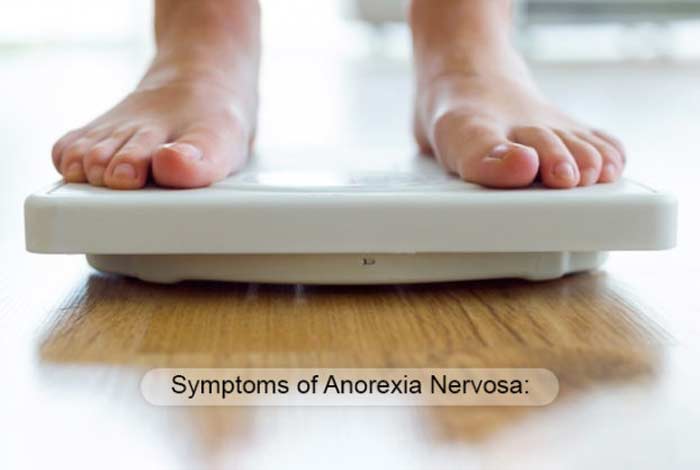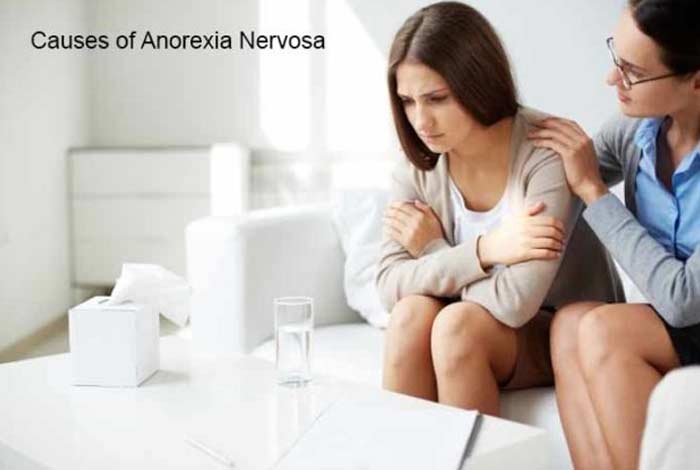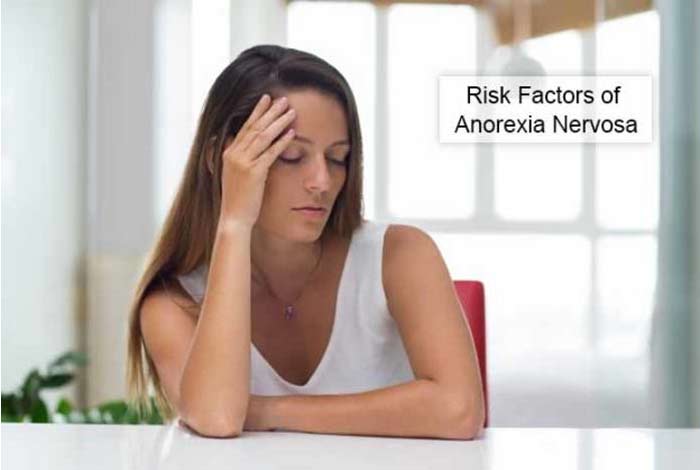
Overview and Facts:
Anorexia Nervosa (AN) is an eating disorder, which has its roots in the psychology of a person, and it could be severe to the point of being even life-threatening. This disease is marked by low body weight in relation to physical stature of the person. These individuals have a difficulty in maintaining proper body weight in accordance with their height and age. People having anorexia nervosa have a huge fear of gaining weight. Their body image defines their self-worth. So, if they are fat, they have a low sense of self-worth. They basically have a wrong perception of self. These people have a strong desire to be thin, so they restrict food intake. People with AN feel that they are overweight when in fact, they are underweight. They eat only small amounts of specific foods. Thus, excessive weight loss and self-starvation occur during anorexia nervosa. This is diagnosed when a person weighs at least 15% less than the normal body weight.
The term anorexia means loss of appetite. People with anorexia nervosa feel hungry, but they try to stay away from food. They see themselves as fat even when they are thin.
In order to reduce body weight, people with anorexia nervosa exercise frequently, force themselves to vomit, and use laxatives. When you have anorexia, the desire to lose weight becomes more important for you than anything else. It is more commonly found in adolescent females, but it can practically effect men and women of all ages. Usually, it begins at the time of puberty. The risk of developing this eating disorder is more in models, dancers and athletes.
Types and Symptoms:
There are two types of anorexia nervosa:
- Binge/Purge Type: People suffering from Purge Type AN forcefully vomits after eating. They feel guilty after eating, so they make it up for it by purging, using laxatives and exercising.
- Restrictive Type: In this type of anorexia nervosa, people curb the amount of food they eat. They feed themselves only with a small amount of food. They basically starve themselves, and restrict their food intake to less than their daily calorific requirements.

Symptoms of Anorexia Nervosa:
It may be difficult to spot anorexia nervosa from normal dieting behavior. However, it may be attributed to other health conditions or possibly be understood as a side effect of prescription medicines. Physical signs, as discussed below, are common symptoms of AN:
- Extreme Weight Loss: A person may experience rapid, unexplained weight loss with no medical cause. People with AN feel that they are overweight or too fat in some places like stomach, hips and thighs.
- Thin Appearance: People with AN might be obsessed with weight, size of their clothes and body shape. Tiny weight fluctuations will bother them a lot.
- Dieting Despite Being Thin: They follow a restricted diet and don’t consume foods that contain carbs or fats, and eating only low-calorie foods. Such people excessively do tasks like reading food labels as well as measuring and weighing portions.
- Lying About Eating: Hiding food or throwing it away to avoid eating. Making excuses for not eating, such as already had a huge lunch or stomach is upset.
Food Preoccupation: People with AN think about food, cooking for others, collecting recipes while eating very less. - Criticizing Appearance: When suffering from AN, people spend a lot of time in front of the mirror; criticizing appearance, and still feel that they are not thin enough.
- Using Diet Pills, Laxatives, or Diuretics: Use of appetite suppressants, drugs for weight loss and abusing laxatives are common habits of people with AN.
- Vomiting After Eating: Throwing up forcefully after eating. Running water in washroom to conceal the sound of vomit and using mouth fresheners, so that one does not smell vomit.
- Exercising: They follow a very harsh exercise regime to burn calories. People with AN can be even found to exercise despite having injury, illness or in bad weather conditions.
- Strange Eating Habits: Patients of AN may have habits like eating in secret. And, being unable to assess one’s own body weight. People with AN strive for perfection and are critical of self.
- Missed Menstrual Periods: Women with anorexia nervosa may face irregular periods and sometimes, even miss them.
- Physical Symptoms: Low tolerance of weather, yellow skin, constipation, anemia and tooth decay are some other symptoms of AN.

Risk Factors of Anorexia Nervosa:
i. Psychological Risk Factors:
- Feelings of low self-esteem and inadequacy
- Behaving impulsively and obsessively
- Unable to express emotions like sadness, anger and fear
- Highly preoccupied with an urge to please others
- Avoidance and fear of conflict
- Striving for perfectionism
ii. Social Factors:
- Cultural values that give importance to looking thin as a way to look beautiful
- Valuing people on the basis of what they look from the outside rather than inside
- Culture of following professions, where lean body is important like dancing, modeling, etc.
iii. Biological Factors:
- There may be some imbalance in certain chemicals in the brain, which may lead to eating disorder.
- Physical and hormonal changes during adolescence.
- Genetic factors; for example, a person, whose parents or siblings have an eating disorder are at a higher risk of developing anorexia nervosa (AN).
iv. External Factors:
- Life events like loss of a family member, separation of parents and job switch may be a trigger for AN.
- Unable to deal with stressful events and having troubled family relationships.
- History of teasing and bullying with matters related to weight and being bulky.
- Negative Body Image: The pressure to look in a particular way may be responsible for creating a negative body image, which too is a risk factor.
Do I have Anorexia Nervosa?
Look for these warning signs of Anorexia to know if you are headed that way:
- You find yourself complaining about being fat
- You do not eat whole foods like carbohydrates
- You hide your hunger when you are actually very hungry
- You do not eat in public and to avoid people from knowing your weight, you wear layers of clothes
- You adopt a difficult exercise routine.
- You start avoiding friends and may lose interest in normal and day-to-day activities.
Nevertheless, these could be the signs of other eating disorders like orthorexia or bulimia. It would be best to consult a doctor to rule out other possibilities. If you are obsessed with eating healthy rather than not eating at all, then you have orthorexia. However, if you are obsessed with not eating all, then you have anorexia. Avoiding friends and limiting social contacts may be the signs of general sadness or depression. But, if the symptoms, mentioned above, accompany these symptoms, then it may be a case of AN.
Causes and Prevention of Anorexia Nervosa:
1. Causes of Anorexia Nervosa:
The exact and true causes of Anorexia Nervosa are not still known. However, broadly they can be divided as detailed below:
- Environmental Causes: Many cultures promote thinness that reinforce the belief that thin people look prettier. There are also many careers and professions like dancing and modeling that encourage being thin and to lose weight. Peer pressure among girls may be at play at times. Childhood trauma like sexual abuse and trauma can also develop such behaviors.
- Biological Causes: Changes in brain functions or levels of hormones have a role to play in the development of anorexia nervosa. Although not sure which genes exactly responsible, there are certain genetic variations that make some people more vulnerable to develop anorexia nervosa. It is not clear if these lead to anorexia or develop as a result of malnutrition. AN may result due to a combination of factors like feelings of stress and hormonal changes. A young woman with a sibling or a parent with eating disorder is at a higher risk of having AN.
- Psychological Causes: Some emotional factors may also contribute to anorexia nervosa. Young girls may have a specific personality trait like OCD (Obsessive Compulsive Disorder) that leads them to sticking to a particular type of diet and refrain from food in spite of feeling hungry. They also self-starve as they consider this as a way to get emotional relief for various conditions, from which they suffer.
Many people, who suffer from anorexia nervosa share some behavioral traits like anxiety and depression. They are unable to handle stress and worry excessively about future. They are also perfectionists, who set strict diet goals. Anorexia can affect people of all ages, genders and races. The disorder generally begins during adolescence. Increasing number of children and adults are being diagnosed with anorexia nervosa. People with anorexia use food as a way to gain control, when other areas of their life are stressful. Emotions like low self-esteem, anger, anxiety may play a role in developing this disorder. This may be caused due to changes in hormones that are known to regulate appetite, thinking, and attitude towards food and weight.
Prevention of Anorexia Nervosa:
It may not be possible to prevent anorexia nervosa, but it is advisable to start treatment as soon as symptoms are detected. In addition to teaching healthy eating habits, positive attitude towards food and weight may be helpful in preventing the development of AN.
Strategies can be developed to minimize the impact of social pressures like pressure to be thin. Preoccupation with weight must be stopped. Counseling should be sought to battle with issues like low self-esteem and perfectionism.
- Do not think that a particular type of body shape will give you happiness or a sense of fulfillment.
- Being aware about various eating disorders will help you avoid judgmental attitudes towards food, eating disorders, weight and body type.
- Learn to take a balanced diet, and stop judging yourself based on your body weight and shape. Start viewing the media critically and stop accepting images portrayed over there as your role models that you want to attain.

Diagnosis and Tests for Anorexia Nervosa:
Not even one test can be used to diagnose anorexia. If your doctor suspects you of having anorexia, he may prescribe you the following tests:
- Examining medical history of physical and emotional health during the past and present.
- Physical examination to check heart, lungs, weight, hair and skin for problems for malnutrition.
- Asking questions about eating habits and what you feel about your health in general.
- Mental assessment and test to check for depression and anxiety.
- Blood tests to check for malnutrition, and urinalysis.
- X-Rays to detect if bones have been weakened due to malnutrition.
Treatment and Care of Anorexia Nervosa:
1. Treatment of Anorexia Nervosa:
Untreated AN may damage the organs like heart and brain. It can even lead to loss of bones and irregular heartbeat. Treatment of AN involves a combination of supervised gain in weight and psychological therapy. Emergency care is needed in cases, where dehydration, malnutrition and kidney failure that pose a risk to life.
Treatment of anorexia is challenging as people may oppose any effort made to gain weight. The treatment plan should be tailor made; meeting the individual requirements of the person in question. The aim of the treatment should be to help a person to gain weight in a healthy way. It should also work on core emotional issues like low self-esteem as well as rectify distorted patterns of thinking and developing behavioral changes. The following methods may be used to cure the condition.
- Psychotherapy: This type of therapy is aimed at changing the behavior and thinking of the person AN. Treatment includes developing healthy attitude towards weight and food.
- Medication: Antidepressant medicines like selective serotonin reuptake inhibitors (SSSRIs) can be used to help control anxiety and depression. Some antidepressants even stimulate appetite. Other medications may be used to correct distorted attitudes towards body image and eating.
- Nutrition Counseling: This strategy is used to develop a healthy approach towards food and weight, and restore normal eating patterns.
- Family or Group Therapy: For the treatment to be successful, family support is imperative. A family should clearly understand the disorder and recognize its symptoms.
Group therapy may also be beneficial for people with this disorder, wherein those having AN can discuss their conditions with others, who are sailing in the same boat. This will enable them to vent out their feelings and relieve their emotional stress. - Hospitalization: For cases, where there is severe weight loss resulting in malnutrition, hospitalization may be required. One should be hospitalized in cases of serious physical and mental health conditions arise like heart disorders and risk of suicide and depression.

Care for People with Anorexia Nervosa:
- Include them in Activities: An affected individual may not want to join in activities, but you must try to talk to them and include them in activities, so as to make them feel valued as a person.
- Build Up their Self-Esteem: Tell them that they are valued irrespective of their weight or how they look, and how much you appreciate their presence in your life.
OTC Medications and Self-Management Methods:
1. Over-the-Counter Medications for Anorexia Nervosa:
Vitamin and mineral supplements are used to treat eating disorders. These medications include calcium and vitamin D. If you suspect anorexia nervosa, you may take calcium supplements and multivitamins containing vitamin D. These supplements help prevent bone loss, which may occur as a result of insufficient intake of nutrients and low levels of hormone, which is generally seen in people with anorexia nervosa. However, these are not substitutes to prescription medicines like SSRIs that are used in the treatment of eating disorder.
2. Self-Management Methods:
- It is important to know what triggers nervosa. Individual with AN often binge in response to stressful events and negative emotions. There is a strong desire to purge if some special occasion is coming up or you are not feeling too good about your body. The more self-aware you are of your situation, the better you will be able to manage your condition.
- Don’t Exercise Too Much: Excess exercise is used by AN-affected individuals as a way to burn off their calories.
- Don’t Compare Yourself to Others: It will not be very motivating to compare yourself to other people, who seem thinner or more fit than you.
Natural Ways of Treating Anorexia Nervosa
The following herbs can be used for treatment of AN:
- Ashwagandha: It helps in weight gain and enhancing appetite. Its usage gives strength to the nervous system and detoxifies body. It also helps improve the digestive system. It works by eliminating underlying psychological cause of anorexia.
- Black Pepper: It stimulates digestion. It activates the liver to produce more bile salts for emulsification of fats in the intestines. It gives the signal to the brain to eat more and hence, quite effective in treating anorexia nervosa.
- Rock Salt: Its usage makes individuals feel hungry and it is a digestive medication for treating anorexia.
- Cardamom: It contains essential oils that work as an appetizer. It is also known to reduce stress and mental fatigue.
Other natural ways of treating anorexia nervosa are listed below:
- Shirodhara: Regular scalp shirodhara can be used to treat psychological causes of anorexia.
- Virechana: It is a purgative therapy in Ayurveda which, helps remove toxins from the body and improve appetite.
- Yoga: It can be a great method to treat anorexia. It develops a balanced state of mind. It promotes positive body image and improves self-esteem.
- Lifestyle Changes: This helps to maintain a healthy attitude towards food and body. To overcome anorexia, one must develop a rational approach to food and dieting.
Health Tip by Experts:
The best way to prevent anorexia nervosa is to develop healthy eating habits and strong body image from an early age.











